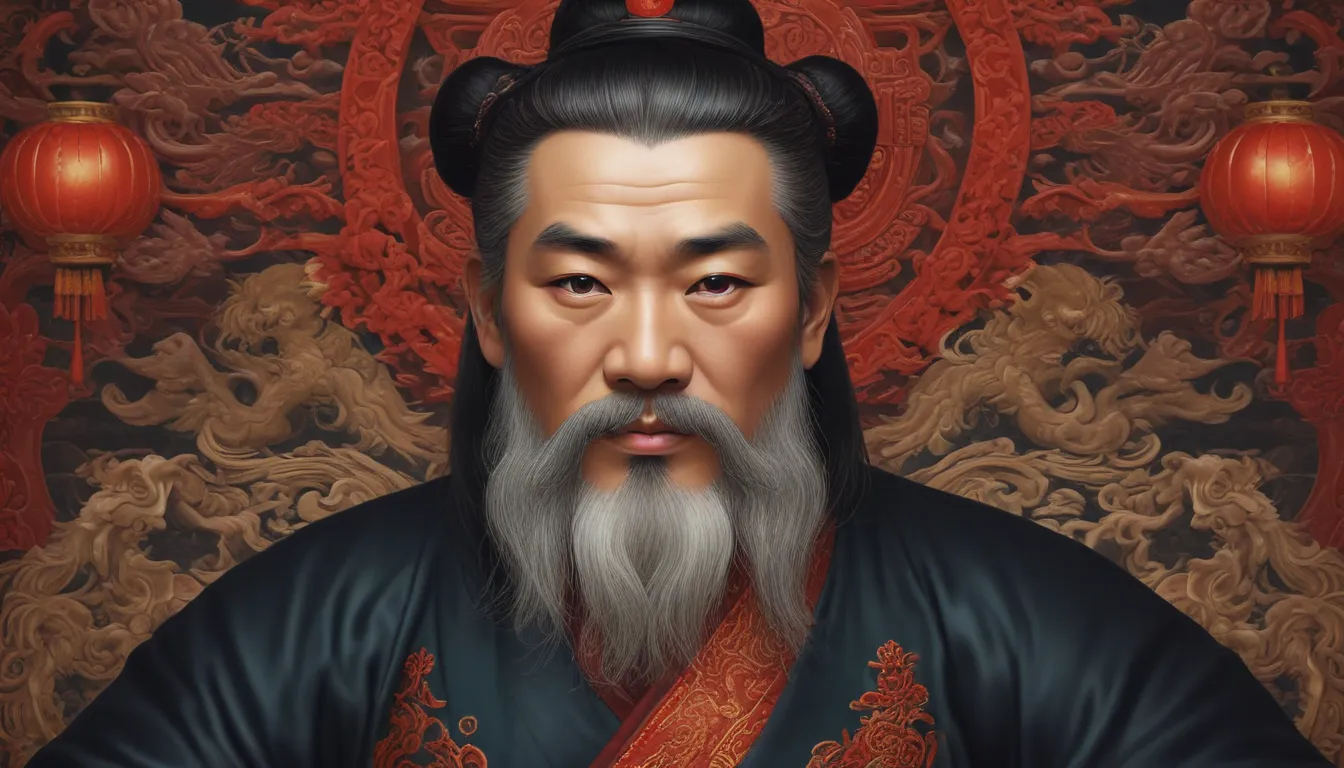The images in our articles may not match the content exactly. They are used to grab your attention, not to show the exact details in the text. The images complement the text but do not replace it.
Welcome to the captivating realm of Confucianism, a philosophical and religious tradition that has captivated East Asian cultures for over 2,500 years. Rooted in ancient China, Confucianism, named after its revered founder Confucius, embodies principles of kindness, education, and family values that have transcended time and influenced societies far beyond its place of origin.
Delving into the Depths of Confucianism
Confucianism’s rich history dates back over 2,500 years, originating in ancient China to become one of the oldest philosophical systems globally. With a profound impact on Chinese culture and society, Confucianism’s teachings have shaped ethical values and social norms for millennia.
Discovering the Wisdom of Confucius
Confucianism derives its name from its visionary founder, Confucius or Kong Zi, a distinguished Chinese philosopher dedicating his teachings to moral values, social harmony, and the pivotal role of education in societal development.
Unveiling the Concept of “Ren”
At the heart of Confucianism lies the profound principle of “Ren,” signifying benevolence or humaneness. Embracing Ren entails treating others with kindness, respect, and empathy, fostering moral virtues and harmonious relationships within society.
Unraveling the Five Great Relationships
Central to Confucianism are the Five Great Relationships, encompassing roles like ruler and subject, father and son, husband and wife, elder brother and younger brother, and friend and friend. Upholding these relationships with righteousness and integrity is paramount in Confucian philosophy.
Embracing the Value of Education
Education stands as a cornerstone in Confucianism, recognized as a transformative tool for nurturing individuals’ moral character and fostering societal harmony. Confucius believed in education as a catalyst for positive societal change.
Engaging with the Analects
The Analects, a revered collection of Confucius’ teachings and ideas, serves as a pivotal text offering insights into the essence of Confucian philosophy through compelling conversations, anecdotes, and aphorisms.
Embracing Filial Piety with Xiao
Confucianism extols the virtue of filial piety, captured in the concept of Xiao, encapsulating the essence of respect, obedience, and care towards parents and elders as a fundamental pillar of social harmony.
Navigating Social Interactions with “Li”
Confucianism advocates for the practice of “Li,” encompassing rituals, etiquette, and proper conduct in social interactions. These guidelines promote respect and appropriate behavior, fostering order and harmony within society.
Embracing the Balance of Yin and Yang
Incorporating Yin and Yang into its teachings, Confucianism acknowledges the need for balance between contrasting and complementary forces in the universe, highlighting the significance of harmony in existence.
Influence on Imperial China’s Political System
Confucianism’s profound influence transcended philosophical realms to shape Imperial China’s political landscape during the Han dynasty, integrating its principles into governance and influencing imperial decisions.
Enduring Legacy Through Dynastic Changes
Despite facing adversities and ideological shifts throughout history, Confucianism persevered through dynastic changes, preserving its influence on Chinese society across centuries.
Extending Influence Beyond China
Confucianism’s impact transcends borders, influencing cultures in countries like Japan, Korea, and Vietnam with its enduring principles shaping social norms, ethical values, and family structures.
Advocating for Social Harmony and Order
Confucius advocated for social stability through ethical governance, moral conduct, and adherence to rituals, fostering harmonious relationships between individuals, families, and the state.
Fostering Knowledge and Self-Improvement
Valuing the pursuit of knowledge and self-improvement, Confucianism encourages individuals to seek wisdom, cultivate virtues, and strive for personal growth through continuous self-reflection and learning.
Evolving Resiliently Over Time
Throughout history, Confucianism adapted to changing contexts while holding steadfast to its core values, remaining a dynamic and adaptable belief system revered for its enduring wisdom.
Inspiring Artistic Expression
Confucian ideals have permeated various art forms, from calligraphy and painting to traditional music and architecture, reflecting values upheld in Confucian teachings and offering insight into the culture.
Embracing the Timeless Wisdom of Confucianism
Embark on a journey through the treasured heritage of Confucianism, a philosophy that transcends time to offer valuable insights into ethical living, social harmony, and personal growth. By delving into the teachings of Confucius, we gain a profound appreciation for virtues like filial piety, respect, and the pursuit of knowledge, shaping not only societal norms but also governance and education systems.
Nurturing Cross-Cultural Understanding
In a rapidly globalizing world, Confucian values serve as a beacon for fostering mutual respect, cooperation, and understanding across diverse cultures and nations. Emphasizing the essence of relationships, personal excellence, and community contribution, Confucianism guides individuals in navigating the complexities of modern society with principles of goodness, harmony, and social cohesion.
Frequently Asked Questions
-
Historical Origins: What is the historical background of Confucianism?
Confucianism traces its origins back to ancient China during the Zhou Dynasty around the 5th century BCE, founded by the esteemed philosopher, educator, and political figure, Confucius. -
Core Teachings: What are the fundamental teachings of Confucianism?
The core teachings of Confucianism revolve around values like filial piety, righteousness, loyalty, and benevolence, emphasizing moral character cultivation and harmonious relationships. -
Contemporary Impact: How does Confucianism influence East Asian cultures today?
Confucianism continues to shape various facets of East Asian societies, including family dynamics, education systems, social hierarchies, political governance, and ethical frameworks. -
Inclusivity: Can individuals of different religious backgrounds practice Confucianism?
Confucianism transcends religious boundaries, serving as a philosophical and ethical system accessible to individuals across diverse religious affiliations, offering guidance on moral conduct and social relationships. -
Promoting Harmony: How does Confucianism foster social harmony?
Confucianism advocates for virtuous relationships and mutual respect among individuals, promoting harmonious coexistence through empathy, respect, and ethical conduct. -
Role of Education: What role does education play in Confucianism?
Education holds significant value in Confucianism, serving as a tool for self-cultivation, moral development, and the lifelong pursuit of knowledge, fostering virtues like wisdom, integrity, and humility. -
Rituals and Practices: Are there specific rituals associated with Confucianism?
While Confucianism does not mandate specific rituals, practices like ancestor worship, rites performance, and festival observance are prevalent in cultures influenced by Confucian values. -
Views on Government: How does Confucianism perceive the role of government?
Confucianism highlights the importance of ethical governance and virtuous leadership, urging rulers to act benevolently and ethically in advancing the welfare and prosperity of their subjects. -
Contemporary Critiques: What are some modern criticisms of Confucianism?
Contemporary criticisms of Confucianism address concerns related to hierarchical structures, patriarchal tendencies, potential stifling of individual autonomy and creativity, and perpetuation of social inequalities. -
Applicability Today: Can the principles of Confucianism be applied in the contemporary world?
Many principles of Confucianism remain relevant and applicable today, offering guidance on ethical conduct, personal responsibility, and fostering harmonious relationships amid complex societal and ethical dilemmas.
Embracing the Authenticity of Confucian Wisdom
As you navigate the profound insights and timeless wisdom of Confucianism, may its teachings inspire you to cultivate virtues, honor relationships, and contribute positively to the harmony of your community and beyond. Through understanding the essence of Confucian philosophy, we embark on a journey of self-discovery, compassion, and ethical living that transcends cultural boundaries and extends a timeless legacy of goodness and unity.






